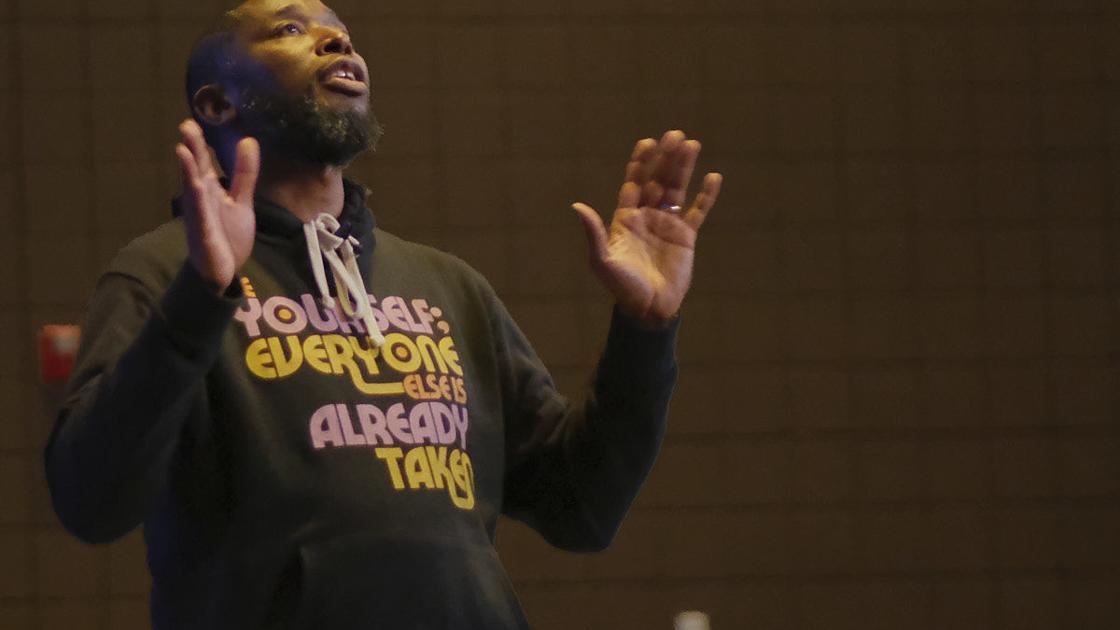What year is often associated with the beginning of hip-hop music?
Which popular Motown song almost didn’t come out of the studio?
Those were the questions posed to students at Elizabeth City State University attending Thursday’s 9th Wonder Origin of Hip-Hop talk.
9th Wonder, real name Patrick Douthit, has worked with dozens of top artists including Jay-Z, Kendrick Lamar, Mary J Blige and Drake. His lecture in the auditorium of ECSU’s Mickey L. Burnim Fine Arts Center was part of the university’s Community Connections lecture series.
The Grammy-winning producer spent about two hours having a conversation, as he called the lecture, with students.
“We’re going to have a conversation,†he said.
Before starting, Douthit encouraged the students to raise their hands at all times to ask questions. Douthit is used to the atmosphere of a classroom; he teaches music at his alma mater NC Central University, as well as at Duke University in Durham.
Douthit began his lecture by talking about the spirituals that slaves sang to each other as they were transported in slave ships across the Atlantic Ocean in the 1600s. Spirituals were not only uplifting, they also provided slaves a way to communicate without “someone” getting the message, he said.
“We transmitted messages to each other through music,” Douthit said, adding that “someone” was “massa”, or the master of slaves.
Douthit worked on his presentation behind two turntables on a table at the front of the auditorium. He walked right and left among the students and stopped every now and then to play samples of over 9,000 songs he said he had on his computer. The songs reflected different stages in the history of black music in the United States.
Douthit noted that in 1959 a new label was formed by a man named Berry Gordy Jr. What began as Tamla Records was a year later incorporated into the larger Motown Record Corporation.
“Motown was by far the best label we’ve ever had,†he said.
Gordy’s commitment to producing meaningful music was tied to a single question: “Will you buy this music or buy a sandwich?” Douthit said.
Gordy started Motown with just $ 400, but went on to produce records of rhythm and blues legends like Marvin Gaye, The Supremes, the Chi-Lites, Stevie Wonder, among others.
Motown Sound is characterized by the emphasis on the rhythm of the song 2/4.
When Douthit brought up points that the students found important, they snapped their fingers in applause. A student asked why he snaps his fingers instead of clapping.
People who attended poetry recitations in cafes in the 1950s or spent time in underground bars from the previous Prohibition era snapped their fingers, instead of clapping their hands, which was louder , explained Douthit.
One song that hardly passed Motown’s “quality control” was Smokey Robinson’s “My Girl,” the producer said.
Several years later, another influential artist has appeared by the name of James Brown and “everything is changing,” Douthit said.
The producer discussed the music of the 1980s, which performed groups like Run DMC. Also in 1984, Russell Simmons and Rick Rubin started Def Jam Recordings in their New York University dorm for $ 600. Among their first clients were LL Cool J and Beastie Boys.
Three years later, a man named Ted Demme created Yo! MTV Raps, airs at 10 p.m. on Saturdays.
Douthit also discussed the Latin Caribbean influence on black music, heard in groups such as Incredible Bongo Band, with their song “Apache”.
The great thing about music is that it can be used to bring people from different backgrounds and cultures together, Douthit said. “Music is the equalizer,†he said.
Speaking to someone in the audience, Douthit told a student that if he doesn’t like the person next to him, ask him what music they like, and they will form a common bond.
Douthit studied music at NC Central, where in 2007 he joined the faculty as Artist in Residence. He teaches similar courses to Duke. He is also involved in a music research project at Harvard University and in 2019 he was inducted into the NC Music Hall of Fame.
He graduated from Glenn High School in Winston-Salem and as a historically black college and university graduate he said he can relate to ECSU students in the public.
“I have been where you are now,†he said, referring to life on campus.
Douthit said that much of what he learned, including life lessons and the music industry, he learned from listening to records.
“Some of my greatest teachers were rappers,†he said.
Douthit called today’s music “soulless†and told the students that if they asked for better music, they would get it.
As for the origins of hip hop, they go back to a building still located at 1520 Sedgewick Avenue in the Bronx Borough of New York.
Last Sunday, US Senator Chuck Schumer and US Congressman Jamaal Bowman, DN.Y., attended a ceremony at the address to celebrate a Congressional resolution declaring 1520 Sedgewick Ave. like the birthplace of hip hop. According to the resolution, the origins date back to August 11, 1973, when the “Back to School Jam†was held in the building’s recreation room.

